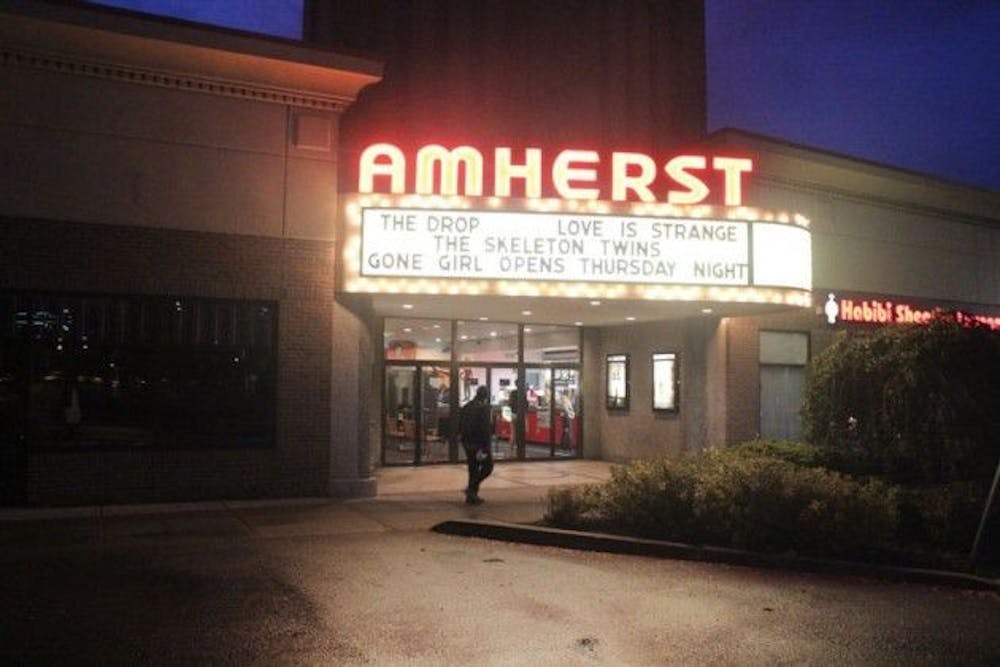“When life’s gettin’ you down, go to a movie.”
At least that’s what Diane Christian, SUNY distinguished professor in the English Department, says.
Christian and her husband of more than 40 years, Bruce Jackson, also a SUNY distinguished professor in the English department, host the Buffalo Film Seminars every Tuesday night at the Dipson Theatre on Main Street near South Campus. The seminars bring together UB students and community members to watch and discuss films dating back as early as the 1920s.
They were originally held downtown at the Market Arcade Theatre. Jackson said he wanted to make downtown Buffalo a more accessible place to students and was disappointed that there are many students who complete their degree at UB without ever setting foot in the downtown area. Jackson understood the positive effect that the seminar could generate.
“From the beginning we just wanted to fill the theatre,” Jackson said.
Despite some believing the downtown area benefited from the theatres’ existence, the building was sold to a developer. The news was devastating to Christian and Jackson.
In response to the theatre closing, Michael Clement, president of Dipson Theatres, opened the doors of his Amherst location to Christian and Jackson to keep interest in classic cinema alive within the community.
Jackson said the seminars help alleviate the ever-existent tension between UB students and the citizens of Buffalo.
Residents have complained for years about students partying in the Heights neighborhood, with tensions reaching a high this semester. Fifty-seven students have gone through Judicial Affairs through the first three weeks of the semester for drinking in the neighborhood.
“The class functions in getting people from the university and the city in the same room, at the same time, without yelling at each other,” Jackson said.
This sense of community is one of the reasons why Christian and Jackson started the series.
“Buffalo has a big movie buff community and people come out for them,” Christian said.
She said this is why the class has grown so popular amongst students and theatre patrons alike, despite the fact a majority of students have never even seen a black and white movie.
People’s concentration on a film can be shaken very easily when in the comfort of their home, but the same cannot be said when one watches a film in a theatre, he said.
“To teach film in a theatre is totally different from teaching in a classroom,” Jackson said.
Jackson tells his students to pay close attention to things such as cinematography, acting and social attitudes portrayed in film and the work they do in making the movies what they are.
“Movies actually serve to teach on topics of society like the prison system, racism, and other social inequalities,” Christian said. “People really get educated through movies and we’re happy to show films that have good politics.”
After every film, students and the general population get into a discussion about what the movie worked to accomplish in terms of meaning and artfulness and what it was not able to achieve under the same parameters.
“It never fails to happen that when we see [the movie] big, we notice something we’ve never seen before,” Jackson said. “Its not trivial conversation.”
Both Christian and Jackson relish their memories of movies that carry social tension, like Raging Bull, a movie dealing with domestic abuse. The movie caused reactions within the audience during one of the seminars.
They said one a man stood up in crowd and said, “I hope were not gonna hear any complaints from women about the film.”
And only seconds after his comment, one woman got up and said, “Yeah you are!”
On another occasion, when Christian and Jackson were presenting Triumph of The Will, a film related to Adolf Hitler’s Nazi regime, Christian said, “We did have some skin heads come to the theatre. They didn’t say anything. They just clapped very loudly when Hitler appeared on the screen.”
She said many people in the crowd were scared, but she thought having the skinheads in the theatre really brought the film to life.
Jackson recently wrote an article for The Public concerning the recent “Black/White Only” signs posted on UB’s North Campus. He tied the film seminars to his article.
In his article, Jackson said, “Art is grounded in intervention:It is about making you see something you would not otherwise have seen, feel something you would not otherwise have felt, understand a feeling you’ve had but could not theretofore have understood. Art is about disturbance.”
It is this definition of art that rings loudly within the four walls of the theatre where the seminar is taught.
And with movies like Mississippi Masala, a film discussing racism, set to play in early November, Jackson and Christian want moviegoers to go in with a mindset that is open to thought provoking discussion in regard to difficult cultural contexts.
Buffalo Film Seminars are open to the public and are held every Tuesday at 7 p.m. in the Dipson Theatre.
Tomas Oliver is an arts staff writer. Arts desk can be reached at arts@ubspectrum.com.





